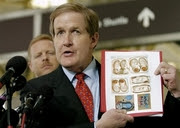
TSA loses hard drive with personal info
By MATT APUZZO, Associated Press Writer 7 minutes ago
WASHINGTON - The Transportation Security Administration has lost a computer hard drive containing
Social Security' name=c1> SEARCHNews News Photos Images Web' name=c3> Social Security numbers, bank data and payroll information for about 100,000 employees.
Authorities realized Thursday the hard drive was missing from a controlled area at
TSA' name=c1> SEARCHNews News Photos Images Web' name=c3> TSA headquarters. TSA Administrator Kip Hawley sent a letter to employees Friday apologizing for the lost data and promising to pay for one year of credit monitoring services.
"TSA has no evidence that an unauthorized individual is using your personal information, but we bring this incident to your attention so that you can be alert to signs of any possible misuse of your identity," Hawley wrote in the letter, which was obtained by The Associated Press. "We profoundly apologize for any inconvenience and concern that this incident has caused you."
The agency said it did not know whether the device is still within headquarters or was stolen.
TSA said it has asked the
FBI' name=c1> SEARCHNews News Photos Images Web' name=c3> FBI and
Secret Service' name=c1> SEARCHNews News Photos Images Web' name=c3> Secret Service to investigate and said it would fire anyone discovered to have violated the agency's data-protection policies.
In a statement released Friday night, the agency said the external — or portable — hard drive contained information on employees who worked for the
Homeland Security' name=c1> SEARCHNews News Photos Images Web' name=c3> Homeland Security agency from January 2002 until August 2005.
TSA, a division of the Homeland Security Department, employs about 50,000 people and is responsible for security of the nation's transportation systems, including airports and train stations.
"It's seems like there's a problem with security inside Homeland Security and that makes no sense," said James Slade, a TSA screener and the executive vice president of the National Treasury Employees Union chapter at John F. Kennedy International Airport. "That's scary. That's my identity. And now who has a hold of it? So many things go on in your mind."
The agency added a section to its Web site Friday night addressing the data security breach and directing people to information about identity theft.
Rep. Sheila Jackson Lee (news, bio, voting record), D-Texas, whose Homeland Security subcommittee oversees the TSA, promised to hold hearings on the security breach. She said Homeland Security buildings are part of the critical infrastructure the agency is charged with protecting.
"We should expect it to be secure," she said.
House Homeland Security Committee Chairman Bennie G. Thompson, D-Miss., called the security breach "a terrible and unfortunate blow" for an agency he said already suffered from low morale.
It's the latest mishap for the government involving computer data. Last year, a laptop with information for more than 26.5 million military personnel, was stolen from a Veterans Affairs Department employee's home. Law enforcement officials recovered the laptop, and the FBI said Social Security numbers and other personal data had not been copied.
___
Associated Press writer Ted Bridis contributed to this report.
TSA' name=c1> SEARCHNews News Photos Images Web' name=c3> TSA headquarters. TSA Administrator Kip Hawley sent a letter to employees Friday apologizing for the lost data and promising to pay for one year of credit monitoring services.
"TSA has no evidence that an unauthorized individual is using your personal information, but we bring this incident to your attention so that you can be alert to signs of any possible misuse of your identity," Hawley wrote in the letter, which was obtained by The Associated Press. "We profoundly apologize for any inconvenience and concern that this incident has caused you."
The agency said it did not know whether the device is still within headquarters or was stolen.
TSA said it has asked the
FBI' name=c1> SEARCHNews News Photos Images Web' name=c3> FBI and
Secret Service' name=c1> SEARCHNews News Photos Images Web' name=c3> Secret Service to investigate and said it would fire anyone discovered to have violated the agency's data-protection policies.
In a statement released Friday night, the agency said the external — or portable — hard drive contained information on employees who worked for the
Homeland Security' name=c1> SEARCHNews News Photos Images Web' name=c3> Homeland Security agency from January 2002 until August 2005.
TSA, a division of the Homeland Security Department, employs about 50,000 people and is responsible for security of the nation's transportation systems, including airports and train stations.
"It's seems like there's a problem with security inside Homeland Security and that makes no sense," said James Slade, a TSA screener and the executive vice president of the National Treasury Employees Union chapter at John F. Kennedy International Airport. "That's scary. That's my identity. And now who has a hold of it? So many things go on in your mind."
The agency added a section to its Web site Friday night addressing the data security breach and directing people to information about identity theft.
Rep. Sheila Jackson Lee (news, bio, voting record), D-Texas, whose Homeland Security subcommittee oversees the TSA, promised to hold hearings on the security breach. She said Homeland Security buildings are part of the critical infrastructure the agency is charged with protecting.
"We should expect it to be secure," she said.
House Homeland Security Committee Chairman Bennie G. Thompson, D-Miss., called the security breach "a terrible and unfortunate blow" for an agency he said already suffered from low morale.
It's the latest mishap for the government involving computer data. Last year, a laptop with information for more than 26.5 million military personnel, was stolen from a Veterans Affairs Department employee's home. Law enforcement officials recovered the laptop, and the FBI said Social Security numbers and other personal data had not been copied.
___
Associated Press writer Ted Bridis contributed to this report.





